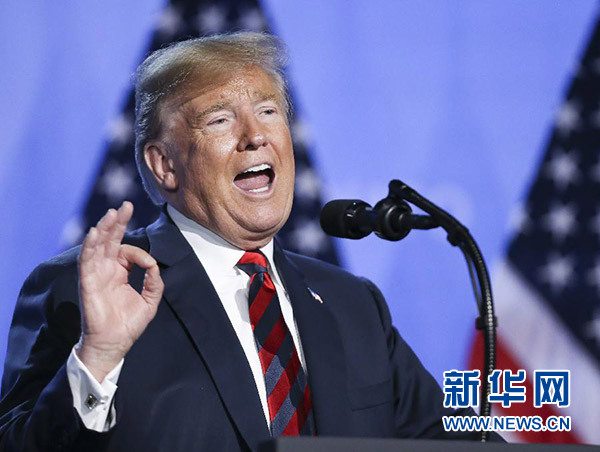Trump thrives in Brussels and London
- By Sajjad Malik
 0 Comment(s)
0 Comment(s) Print
Print E-mail China.org.cn, July 18, 2018
E-mail China.org.cn, July 18, 2018

Donald Trump in a rare press conference after a divisive NATO summit in Brussels credited himself for its "success." His yardstick for success is that the members of the alliance are ready to contribute more funds to meet the expenses of the collective security apparatus.
This kind of success comes at a price because more cash will be available in future but the genuine spirit of cooperation will slowly diminish. Ironically, Trump's bid to make the alliance stronger can actually weaken it. But it is not his concern -- at least for now.
Trump's outburst started even before the start of the two-day meeting. Germany was at the receiving end and flayed for not contributing enough into NATO while working with Russia to build a pipeline to import cheaper fuel, according to Trump.
The verbal assault on Germany was not out of the blue. Trump reportedly has a dislike for Angela Merkel and may be exploiting her domestic troubles to further weaken her position back home.
The dislike is mutual, though. The German leader is vocal and known for putting her views on the table frankly and openly. She reportedly also opposes Trump.
There is even a debate about how Trump conducted himself at Brussels. Some people disagree with his timing of launching attacks on allies; others condone it as his style and part of his straight-talking approach to diplomacy. The truth is he is not cut for traditional diplomacy. After all, by training, he is a businessman and not a politician.
He is apparently hurt to see that most NATO members are either unwilling or unable to pay for the cost of the security being provided to them by the Americans against the threat of Russia.
American tax-payers' money is being spent to save Europe. But the EU hardly gives any concession to the U.S. on trade. This is one of the major reasons for increasing differences between the traditional trans-Atlantic allies.
What Trump said at Brussels is not new; his predecessor also had been pressing the allies to start paying more. They agreed in 2014 to increase their share of NATO spending to 2 percent of their respective GDP by 2024. But it will be too late for Trump who is in a hurry.
During the presidential election campaign Trump had questioned the very existence of NATO. He also spoke bluntly at the NATO summit last year, which he attended for the first time after winning the election. Thus, there is consistency in his attitude towards NATO.
After Brussels, Trump travelled to the U.K. on a working visit. The visit was long overdue as he had already made around 17 foreign trips not including London. It is odd as PM Theresa May was the first foreign leader to dash to Washington when he became president after winning the election.
She also invited him for a state visit but it could not materialize due to various factors. Recently more differences cropped up between the two nations on issues like tariffs and the shifting of the U.S. embassy to Jerusalem.
Trump also angered many Britons after retweeting the messages of a British far-right group and praising the Brexit vote.
Trump was warned to expect rowdy encounters in the U.K. and demonstrations were organized against him by groups and individuals who oppose his polices, including his stance on immigration and minority groups like Muslims.
Trump's interview with a local newspaper also impacted the atmosphere. His remarks that former foreign secretary Boris Johnson will prove a good premier caused embarrassment for Theresa May.
But the relations between the two sides are quite robust due to strong institutional and defense linkages. May maintained composure even after the interview and both leaders witnessed a joint anti-terrorism drill by the U.S. and U.K. special forces.
However, a big question mark hangs over trade, commercial and economic relations. Trump added fuel to fire by hinting that a trade deal with London may not be possible if May's Brexit plan goes ahead.
The U.K. government may also feel disappointment at Trump's meeting with Putin soon after visiting London due to the recent incidents of nerve agent attacks for which Moscow has been blamed.
Despite hiccups and unease both at Brussels and London, Trump is undeterred. His strong-arm tactics are transforming his image and he is emerging as a leader who can go to any length to safeguard the interests of his people.
Sajjad Malik is a columnist with China.org.cn. For more information please visit:
http://m.keyanhelp.cn/opinion/SajjadMalik.htm
Opinion articles reflect the views of their authors, not necessarily those of China.org.cn.





